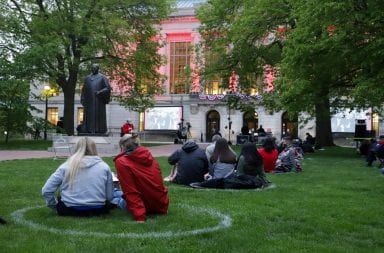Ohio State women’s basketball coach Jim Foster hasn’t quite embraced the idea of social media.
“I mean really, tweeting?” Foster said. “Who cares what you think at the moment, you’re going to change your mind in five.”
He might not tweet about his 760 career wins, a Final Four appearance or being 12th on the all-time NCAA wins list, but he’s not afraid to share one aspect of his career: getting all his players to earn degrees.
Before coming to OSU in 2002, he coached at Vanderbilt University in Nashville, Tenn., and St. Joseph’s University in Philadelphia, Pa. At each school, every player he has coached has graduated.
“I don’t think you ever start out to do anything like that,” Foster said. “It just sort of happened.”
Many student-athletes perform a delicate balancing act when it comes to studies and sports. Foster said he understands the difficulties students face, but his past experiences have shaped the standard he holds for his players.
After his enlistment in the Army, which included a tour in Vietnam, Foster attended junior college before enrolling at Temple University in Philadelphia. While at Temple, he coached boys and girls basketball at a high school in Wyncote, Pa. In 1978, the Temple undergraduate was named women’s coach at nearby St. Joseph’s University.
“For the last two years I was coaching college players while pursuing my degree at Temple,” Foster said.
That’s not all he was doing.
On top of being a full-time student and an NCAA coach, Foster ran a group home for neglected boys while also bartending. It all totaled for an 80-hour workweek.
“I never quite understood the difficulty in managing your schedule,” he said.
Foster’s message of hard work on the court and in the classroom is evident in his former student-athletes.
“There was not ‘athlete’ in the word — you were a student first,” said Emily Beth Howe, a former Buckeye who played under Foster. Howe graduated OSU in 2005 with a business degree before attending Belmont University in Nashville, Tenn., where she earned her master’s in sports management. She now works in sales at the OSU athletic department and said she still remembers what Foster expected from his players.
“He didn’t care if you scored two points or 20 points,” Howe said. “The importance was academics.”
Even when a player transferred from the team, Foster said he kept tabs on their progress.
The scholarships Foster has given student-athletes afforded some an opportunity to attend college when they otherwise might not have.
That opportunity creates a positive ripple effect for the coming generations, Foster said.
“Now their children are getting ready for college,” Foster said. “And if they hadn’t been given the opportunity, the next generation probably wouldn’t be in the position they’re in.”
In an era where some student-athletes are blinded by short-term success, rather than long-term goals, Foster has a message.
“The more you discipline yourself now, the more opportunity for success you’re going to have later,” he said.
Although the younger generation might forget in five minutes, that message might be a thought worth tweeting about.
Ohio


